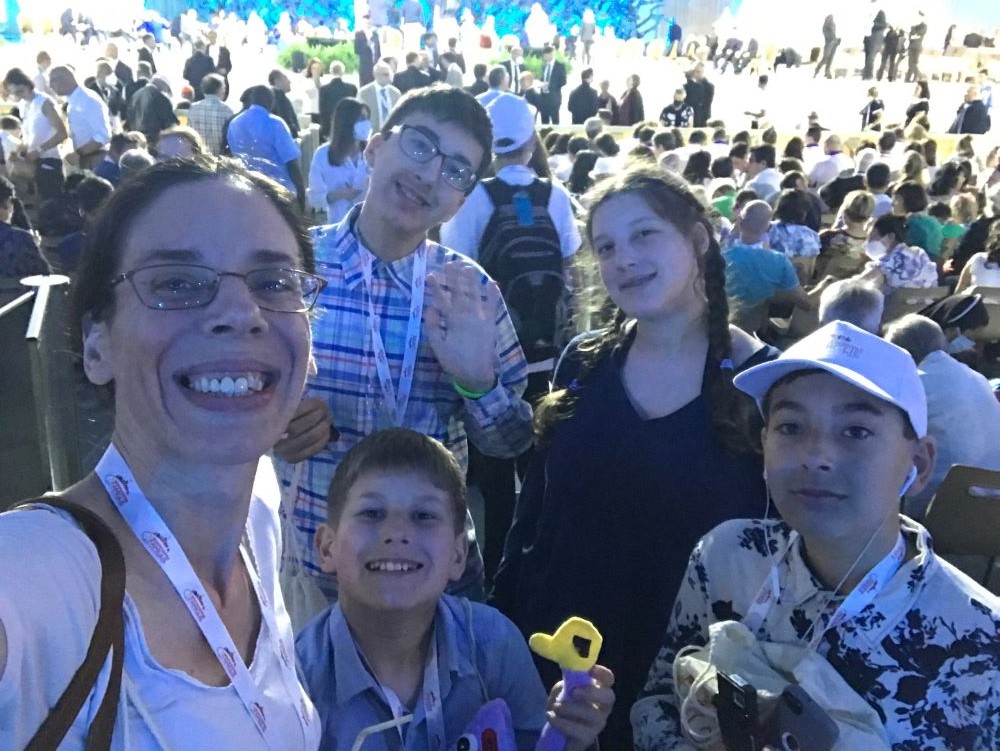Pope Francis kisses a baby before attending Mass in St. Peter's Square during the World Meeting of Families at the Vatican June 25. The event usually takes place every three years, but it was not held last year because of the COVID-19 pandemic. (CNS/Vatican Media)
As a theologian who has been working on the theology of the family and writing about the dynamic intersection of theology and experience, I was excited to be an invited delegate for the World Meeting of Families 2022 earlier this summer in Rome — and especially excited to attend with my family.
The meeting is usually held every three years, although this one was pushed back a year because of the pandemic. My family and I have been to a World Meeting of Families before, as I was director of content and programming for the one connected to the papal visit at Philadelphia in 2015.
That does not mean this trip was easy. In fact, the Rome trip was chaos from the beginning — my husband had recently been hospitalized and stayed home, I had an emergency dental procedure the morning before the flight, many flights were canceled, and I was worried about COVID exposures. Things did not improve after arrival, as dragging around four children with jetlag is never easy, nor is doing so in a location that I have only visited a couple times. I felt vulnerable and tired, uncertain about the structures that were slowly being revealed to me regarding the meeting schedule, when/whether food was provided and more.
But this is life, right? Being in relationship with others, in a family, in a church or any community is often difficult. Plans constantly require adaptation, and the World Meeting of Families was no different. At one point I saw via Twitter that the start time for the papal Mass had been moved 75 minutes later due to the heat, which gave me a chuckle and an edge of anxiety as I tried to imagine us so casually — with just a couple of days' notice — doing such a thing in Philadelphia, where papal Masses are rare and highly anticipated.
Our journeys and relationships in life can be unpredictable, family dynamics and logistics can be complicated, considerations such as those connected to the natural world — like the heat that prompted the Rome planners to change the papal Mass time — can require unanticipated shifts and accommodations. The same is true as we travel together in this pilgrim church.

Mary Beth Yount and her children attended the Festival of the Families during the World Meeting of Families in Rome. Yount, associate professor of theological studies at Neumann University in Pennsylvania, was an invited delegate for the June 22-26 event. (Courtesy of Mary Beth Yount)
Although each World Meeting of Families is an experience of its own, they feature common structural elements, such as a theme (this one was “Family Love: A Vocation and a Path to Holiness”); preparatory catechetical components such as carrying forward Amoris Laetitia, the exhortation that itself proceeds out of the synods of bishops on the family held in 2014 and 2015; a theological-pastoral conference with talks; a festival of families with musical acts and similar celebratory elements at which families share their stories with the pope and everyone else; and a papal Mass.
This one was quite different than the 2015 event, in part because the Rome meeting emphasized virtual participation, with plans to invite only 2,000 in-person delegates to the theological-pastoral congress. By contrast, the Philadelphia event had at least 18,000 in attendance on just one day, with more coming and going during the four-day conference.
But the local context of this year's meeting also informed the programming and the entire experience. In Rome it felt much more relaxed, with a flexible sense of time and scheduling that my regular context lacks. Many speakers and attendees were local as well, although, as is typical for this gathering, representatives from around the world joined.
There is a lot that I appreciate about events such as these in our church, and we need more of them. The local informs the global and, conversely, the global informs the local. This dynamic interplay is important to learning and growth, and it is necessary to our theology and development of doctrine.
Connections to the real and the messy are essential to prevent our teachings from uplifting only idealized, impossible images or other evasions that avoid the hard truths.
We, as a whole church, need to consciously keep ourselves open to the inspiration of the Holy Spirit that connects us with the fruits of the wisdom that emerges from the practical, lived realities of experience. Real life needs to inform our theology just as our theology informs the ways that we interpret our experiences. Connections to the real and the messy are essential to prevent our teachings from uplifting only idealized, impossible images or other evasions that avoid the hard truths.
In addition to the chaos, the Rome trip included wonderful moments. Seeing the wide eyes of my children as they looked at the Vatican, eating the seemingly endless food and sweet treats on the long tables provided in the Paul VI Hall by the organizers, feeling inspired for the future while listening to presenters talk about ways we can support families and individuals, attending a concert at the Lateran Palace, meeting a lot of people from around the world — even the small details like watching my children eat gelateria in the sunshine and laugh with the friendly shopkeeper that we visited almost every day.
The jumble of chaos and joy, messiness and wonderfulness — this is all in line with the spirit of the World Meeting of Families. If the meeting is to help us, as a church, to learn to support and care for families, then it is, in many ways, appropriate that all of this be part of it. Families spoke officially and unofficially, they provided testimonies and advice, they struggled and triumphed, they had fussy children and laughed together. People switched spots so the small attendees could see better, they offered each other bottles of water under the hot sun, they got cranky and snapped at each other. All of these things are part of the embodied, practical experiences that shape our church and help it grow in wisdom and understanding.
Advertisement
In the Catholic Church there is a deep, longstanding recognition of the value of experience. We are a sacramental church, one with the richness of concrete, earthly elements such as water and bread playing an essential role in the sacraments. The dynamic interaction of beliefs and experience explicitly fostered at events such as the World Meeting of Families both expresses our theology and helps to develop that theology, encouraging encounters and blending the real and the ideal, the practical and the theological. All this reminds us that we are people in an already and not-yet world and requires that the real enrich the overly idealized notions of family that we often construct.
Experiences in life can be messy and hard, but also graced, and that is how the Rome 2022 meeting felt. I am grateful for this, as it seems especially appropriate for something related to our theology of, and pastoral care for, the family. Our encounters and relationships in life are complicated and radical, which can allow us to be open to the Holy Spirit and grow in unpredictable ways, and, likewise, this can also be true of our church.





